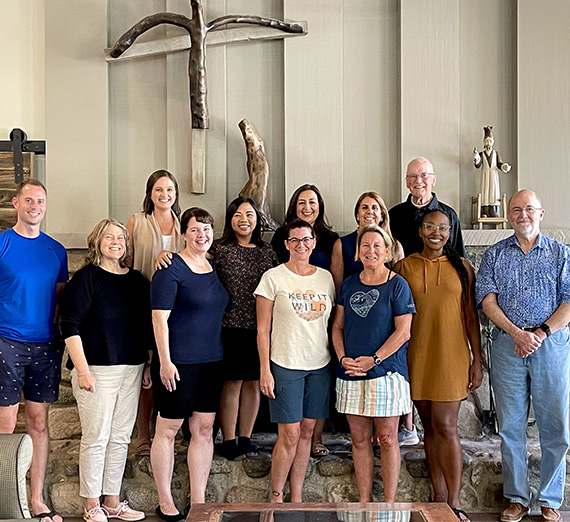A Pandemic Pivot

A unique course at a Benedictine Monastery in Southern California had always intrigued Carrie DeDonker. She wanted to know what living with monks at a monastery could teach her about leadership and community. It was early spring of 2020, she was working at a leadership firm while pursuing an online Master’s in Organizational Leadership (ORGL) through Gonzaga, so she decided to take the course.
However, within a few weeks, the COVID-19 pandemic brought life to an abrupt standstill. Faced with this unforeseen disruption, DeDonker wondered how her search for community could evolve in a suddenly remote world.
Students, faculty and the monks decided to adapt, and very soon DeDonker and her classmates were having a virtual version of life at the monastery. To her surprise, she discovered a vibrant community can exist over Zoom.
“We ended up doing video interviews real time with the monks, which was really neat because they had never used Zoom before. They would livestream some of the prayer services that we would normally attend as students when we were on site so we could participate that way,” said DeDonker.
DeDonker alongside her professor and classmates decided to meet one to two times a week in a real-time Zoom environment.
“People shared what they were feeling, what they were observing in their workplace, and talked about the implications of COVID-19 and social distancing and quarantine, which were all very new at the time, and how that affects community.”
DeDonker continued, “We were applying the study of community to a shifting landscape as it was changing in that very moment. All of our lives had pretty much flipped, and it was neat being able to dissect that in a learning environment and talk about the implications on community while building a community of our own.”
When the class finished, DeDonker and her classmates chose to stay in touch and have collectively visited St. Andrew’s Abbey three times since.
“I viewed it as a privilege because I had missed the opportunity as a student while in the class due to the timing of the course. I was just so fortunate that our community had remained intact long enough to be able to recreate the experience,” said DeDonker.
While DeDonker and her classmates learned valuable lessons from their virtual experience, attending in-person allowed them to gain a deeper understanding of themselves.
“One of my values that became clear to me while at Gonzaga is the value of spaciousness, which for me, is carving out time to be and not just do. That's something that I really saw the monks were intentional about and that intentionality is so important because without intentionality, spaciousness can easily get crowded in by life's demands whether it’s work, family or friends. I am now more intentional with how I schedule my life or week.”
DeDonker, who now runs her own leadership consulting business, continued, “It just brought a lot of clarity to why community is so important to me. It became a driver in the work that I do. It became a guiding purpose of how I show up as a leader. I would highly recommend taking the course.”
However, within a few weeks, the COVID-19 pandemic brought life to an abrupt standstill. Faced with this unforeseen disruption, DeDonker wondered how her search for community could evolve in a suddenly remote world.
Students, faculty and the monks decided to adapt, and very soon DeDonker and her classmates were having a virtual version of life at the monastery. To her surprise, she discovered a vibrant community can exist over Zoom.
“We ended up doing video interviews real time with the monks, which was really neat because they had never used Zoom before. They would livestream some of the prayer services that we would normally attend as students when we were on site so we could participate that way,” said DeDonker.
DeDonker alongside her professor and classmates decided to meet one to two times a week in a real-time Zoom environment.
“People shared what they were feeling, what they were observing in their workplace, and talked about the implications of COVID-19 and social distancing and quarantine, which were all very new at the time, and how that affects community.”
DeDonker continued, “We were applying the study of community to a shifting landscape as it was changing in that very moment. All of our lives had pretty much flipped, and it was neat being able to dissect that in a learning environment and talk about the implications on community while building a community of our own.”
When the class finished, DeDonker and her classmates chose to stay in touch and have collectively visited St. Andrew’s Abbey three times since.
“I viewed it as a privilege because I had missed the opportunity as a student while in the class due to the timing of the course. I was just so fortunate that our community had remained intact long enough to be able to recreate the experience,” said DeDonker.
While DeDonker and her classmates learned valuable lessons from their virtual experience, attending in-person allowed them to gain a deeper understanding of themselves.
“One of my values that became clear to me while at Gonzaga is the value of spaciousness, which for me, is carving out time to be and not just do. That's something that I really saw the monks were intentional about and that intentionality is so important because without intentionality, spaciousness can easily get crowded in by life's demands whether it’s work, family or friends. I am now more intentional with how I schedule my life or week.”
DeDonker, who now runs her own leadership consulting business, continued, “It just brought a lot of clarity to why community is so important to me. It became a driver in the work that I do. It became a guiding purpose of how I show up as a leader. I would highly recommend taking the course.”
